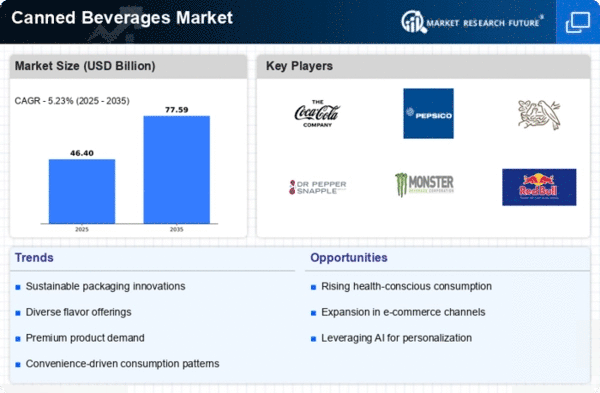Top Industry Leaders in the Canned Beverages Market

The competitive landscape of the canned beverages market is marked by a dynamic interplay of key players, each vying for a significant share in this rapidly growing industry. As of the latest analysis, the following companies stand out as major players in the market:
- PepsiCo
- The Coca- Cola Company
- Keurig Dr Pepper Inc.
- RED BULL
- Del Monte Fresh
- Gallo Winery
- The Boston Beer Company
- Precept Wine
- The Family Coppola
- Left Hand Brewing Co.
In terms of strategies adopted, key players in the canned beverages market are increasingly focusing on diversification and innovation. Product differentiation through the introduction of new flavors, variations, and healthier options has become a common trend. Additionally, strategic partnerships and collaborations with retailers and distributors are crucial to expanding market reach and ensuring widespread availability of products.
Market Share Analysis Factors
Market share analysis in this competitive landscape is influenced by various factors. Brand recognition, product quality, pricing strategy, and distribution network strength are primary determinants. Companies with a well-established global presence often have an advantage, but localized strategies are equally important to cater to diverse consumer preferences.
New & Emerging Companies:
New and emerging companies are entering the market, contributing to the competitive dynamics. These players often differentiate themselves by emphasizing sustainability, health benefits, or unique flavors. With consumers becoming more conscious about their beverage choices, smaller companies have the opportunity to carve out niches within specific segments.
Industry Trends:
In terms of industry news and current investment trends, the canned beverages market has witnessed increased investments in sustainable packaging solutions. As environmental concerns grow, key players are exploring eco-friendly packaging alternatives to meet consumer expectations and regulatory requirements. Companies are investing in research and development to create packaging that reduces environmental impact without compromising product quality.
Competitive Scenario:
Overall, the competitive scenario in the canned beverages market is intense, driven by innovation, consumer preferences, and sustainability concerns. The market is witnessing a shift towards healthier options, including low-calorie, low-sugar, and functional beverages. Additionally, the rise of niche players and a focus on regional preferences contribute to the complexity of the competitive landscape.
Recent Development
several noteworthy developments have shaped the industry. Major players have continued to invest in advanced production technologies, enhancing efficiency and reducing manufacturing costs. Coca-Cola, for instance, announced significant investments in automated production lines to streamline its operations and maintain competitiveness.
PepsiCo, on the other hand, made headlines with its acquisition of a prominent beverage technology company, signaling a strategic move to enhance its capabilities in product development and innovation. This acquisition aligns with PepsiCo's commitment to staying at the forefront of consumer trends and preferences.
Furthermore, industry consolidation has been observed, with some key players forming alliances to strengthen their market position. Collaborations in distribution, marketing, and even joint ventures for product development have become common strategies to navigate the evolving landscape and achieve mutual benefits.











